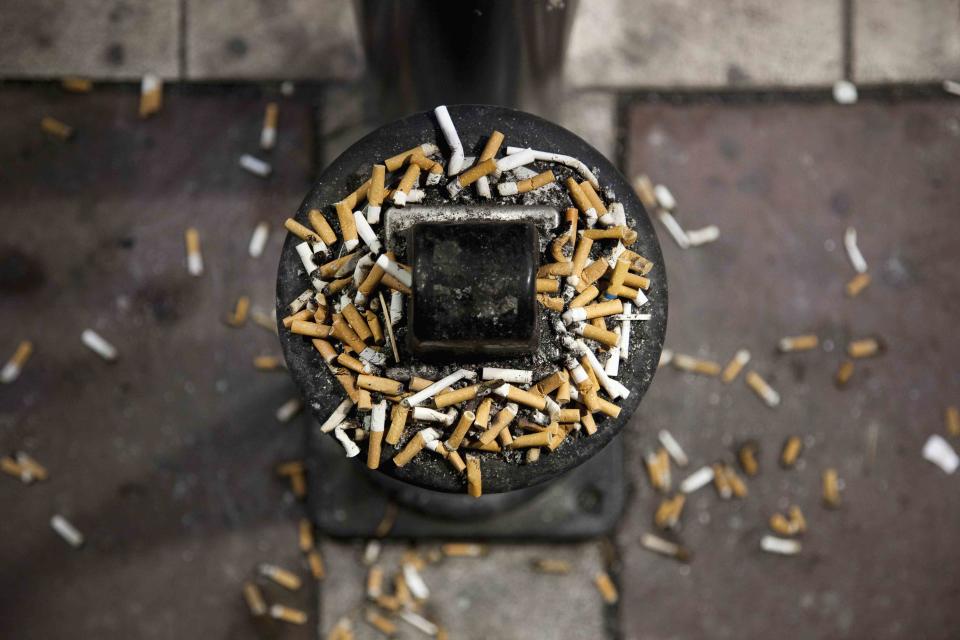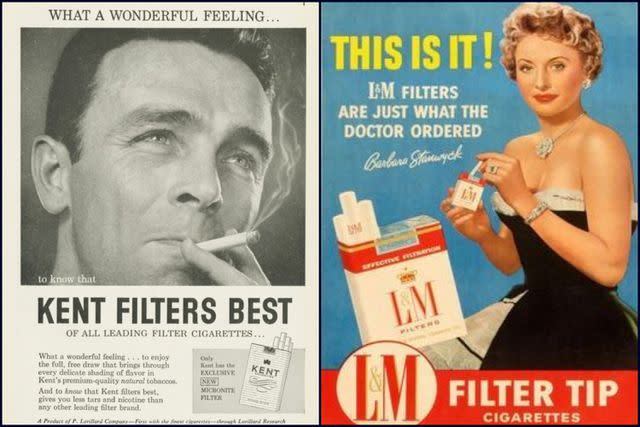It's Time to Ban Cigarette Filters
The world's most common type of litter, cigarette filters leach thousands of toxic chemicals and microplastics into the environment.

We thought plastic straws were bad? Cigarette filters would like a word. Unlike the very obvious litter impact of single-use plastic straws, shopping bags, or bottles, cigarette butts seem unassuming. How bad could they be?
Well, we already know from numerous studies that cigarette filters are the world’s most common form of litter. But now, a study from the University of Gothenburg adds a new level of urgency to the need to address the scourge. The researchers found that filters leaching thousands of toxic chemicals and plastic fibers into the environment further harm aquatic animals.
The Rise of the Filter Tip Cigarette
Prior to 1950, less than 1% percent of cigarettes were filtered. But in the early 1950s, links between smoking and cancer were established, sparking the tobacco industry to create filters to make “safer” cigarettes. As explained in a Surgeon General's report published by the CDC in 2010, "the increasing lay press coverage of the potential dangers of smoking led to an explosion of filter development and marketing."

Public Domain
In fact, in an attempt to counter the market impact of smoking's health risks, the industry launched a flood of cigarette filters and no small amount of spin. Advertising spending went from $55 million in 1952 to approximately $150 million in 1959.
By 1960, filtered cigarettes represented 51% of the cigarette market. By 2005, they represented almost all of the market.
The Problems With Filters
Filters Create More Health Hazards, Not Fewer
If filters made smoking safer, that would be one thing. But they don't.
In the 1960s, agencies assessed tar and nicotine yields based on a uniform machine-based test method for measurement, which in the end, didn't correspond to the tar and nicotine yields that actual smokers were (and are) getting. As the Surgeon General's report notes, the data and evidence do not demonstrate that "efforts to lower machine-measured tar and nicotine yields actually decreased the health risks of smoking, primarily because these changes did not reduce smokers’ actual exposure to tobacco toxicants." The report goes on to detail how filters make smoking even more addictive and dangerous.
Meanwhile, an opinion piece was written by study author Bethanie Carney Almroth, Professor of Ecotoxicology at the University of Gothenburg, and other experts. They explain that filters can splinter, causing smokers to inhale plastic fibers. (Cigarette filters are made of the plastic cellulose acetate.) The authors also corroborate that filters never made smoking safer but instead created more health hazards. "Despite these issues, the majority (>90 %) of cigarettes today are sold with a single-use plastic filter composed of a collection of cellulose acetate fibers and various additives."
Cigarette Butts are Everywhere
Cigarettes are one of the most commonly found litter items in public spaces and one of the most frequently found litter items at beaches worldwide. While sales of cigarettes in the United States have been declining for decades, there were still 203.7 billion cigarettes sold in 2020. Globally, an estimated 4.5 trillion used cigarette filters enter the environment each year.
The Gothenburg study discusses behavior around cigarette litter—and it helps to explain why so many people find it surprising that cigarette butts are problematic. The authors note that cigarette littering occurs more frequently compared to littering of other items. In fact, the littering rate for cigarettes is 65%, but only 17% for general litter. From the study:
Smokers seem to have unrealistic perception of their behaviour and its harmfulness. Although smokers think they litter one out of 10 cigarettes, littering observations revealed that smokers littered two out of three cigarettes. Most importantly, studies from the US and Germany confirmed that the majority of smokers do not know that cigarette filters are made from plastic material. This was also the case among adolescents and young adults that were considered to be part of a more eco-conscious generation.
Filters are Filled With Plastic
The authors of the opinion piece note that "each cigarette filter contains approximately 15,000 microplastic fibers and can shed these at a rate of around 100 microplastic fibers per day into water."
Filters are Filled With Chemicals
With so many butts strewn about, cigarette filters eventually end up in aquatic environments through wind, rain, and drainage systems or stormwater sewers. From the study:
Once there, cigarette filter litter can leach multiple chemicals that derive from tobacco harvesting and processing (e.g. pesticide residuals), from the filter production (e.g. titanium dioxide, triacetin), or the combustion process (e.g. metals). Smoked cigarette filters can leach polycyclic aromatic hydrocarbons (PAHs)- especially naphthalene, nicotine, ethylphenol, benzene, toluene, ethylbenzol, xylene (BTEX), and heavy metals into water. In turn, dissolved PAHs, nicotine, BTEX and heavy metals can accumulate in the tissue of aquatic biota. Overall, cigarette filter litter is classified as hazardous waste with a long-term hazardous potential, under the EU Waste Framework Directive
“The filter is full of thousands of toxic chemicals and microplastic fibres, so it’s not just any piece of plastic that’s being discarded into the environment. It’s hazardous waste,” says Almroth.
A Threat to Animals & Ecosystems
The Gothenburg researchers tested the effects of this toxic soup on aquatic mosquito larvae, finding that the toxins lead to a 20% higher mortality rate among mosquito larvae. (Sure, some may rejoice to hear this—but mosquitoes aren't the point!) Earlier research reveals that the toxins in the filters are harmful to many other aquatic organisms.
"For example," write the authors, "fish can die if they are exposed to concentrations corresponding to the toxins exuded by barely two cigarette butts in one liter of water for four days." Since 2006, nearly three dozen studies have looked at the toxicity of cigarette filters in plants and animals in both aquatic and terrestrial habitats, documenting an array of lethal and harmful impacts.
“Cigarette filters are also a major source of the microplastics that find their way into our environment—something we know has a major negative impact on biological life,” says Almroth.
Banning Plastic Cigarette Filters
Almroth and the others are calling for a ban on cigarette filters, calling them hazardous, low-hanging fruit with no benefit to society.
"We stand at a crossroads where the quantity of plastics and other 'novel entities' exceeds planetary boundaries and threatens the stability of Earth systems ... Cigarette filters are a marketing tool, not a protective health device, that pose both health and ecological concerns; thus, restricting them benefits both public and environmental health," write the authors.

“[T]hey have to be taken off the market entirely,” says Almroth. “It’s not the right approach to focus on making tobacco producers pay for cleaning up the filters. The problem should be prevented in the first place, rather than cleaned up later.”
Given the strength of the industry and the fact that Big Tobacco would have to undo 60 years' worth of marketing touting filters as a healthful add-on, one can imagine there'd be much resistance. What are they going to say? "Whoops, filters were actually more harmful to smokers, and they're wreaking toxic plastic havoc on the planet"?
Nonetheless, as the opinion authors say of an outright ban on cigarette filters, it would be "a relatively minor institutional change that would reduce pollution and minimize an all-too-common form of single-use plastic debris containing multiple toxic chemicals."
"Banning plastic filters would facilitate the transition towards more sustainable consumption," they add, "and as such, aligns with the principles of Earth stewardship as well as the broad international mandate to develop a UN Treaty to end plastic pollution."
The study, "Smokers´ behaviour and the toxicity of cigarette filters to aquatic life: a multidisciplinary study," was published in the scientific journal Microplastics and Nanoplastics.

